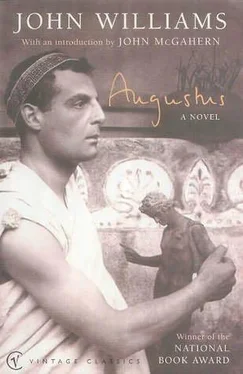John Williams - Augustus
Здесь есть возможность читать онлайн «John Williams - Augustus» весь текст электронной книги совершенно бесплатно (целиком полную версию без сокращений). В некоторых случаях можно слушать аудио, скачать через торрент в формате fb2 и присутствует краткое содержание. Жанр: Историческая проза, на английском языке. Описание произведения, (предисловие) а так же отзывы посетителей доступны на портале библиотеки ЛибКат.
- Название:Augustus
- Автор:
- Жанр:
- Год:неизвестен
- ISBN:нет данных
- Рейтинг книги:3 / 5. Голосов: 1
-
Избранное:Добавить в избранное
- Отзывы:
-
Ваша оценка:
- 60
- 1
- 2
- 3
- 4
- 5
Augustus: краткое содержание, описание и аннотация
Предлагаем к чтению аннотацию, описание, краткое содержание или предисловие (зависит от того, что написал сам автор книги «Augustus»). Если вы не нашли необходимую информацию о книге — напишите в комментариях, мы постараемся отыскать её.
Augustus — читать онлайн бесплатно полную книгу (весь текст) целиком
Ниже представлен текст книги, разбитый по страницам. Система сохранения места последней прочитанной страницы, позволяет с удобством читать онлайн бесплатно книгу «Augustus», без необходимости каждый раз заново искать на чём Вы остановились. Поставьте закладку, и сможете в любой момент перейти на страницу, на которой закончили чтение.
Интервал:
Закладка:
It was, however, my responsibility for the third contract which Octavius most nearly resented, I think; it was with Scribonia, and it was accomplished within the year after his divorce from Clodia, during our most desperate months, when it seemed that we would either be crushed by the Antonian uprisings in Italy, or by the encroachment of Sextus Pompeius from the south. In what seems now a too desperate effort at conciliation, I went to Sicily to negotiate with Sextus Pompeius-an impossible task, for Pompeius was an impossible man. He was a bit mad, I think-more like an animal than a human. He was an outlaw, and that in more than the legal sense; he is one of the few men with whom I have had converse who so repelled me that I had difficulty in dealing with him. I know, my dear Livy, that you admired his father; but you never met either of them, and you certainly did not know his son… In any event, I talked to Pompeius, and extracted what I thought was an agreement-and sealed the compact with an arrangement of marriage with that Scribonia, who was the younger sister of Pompeius's father-in-law. Scribonia, Scribonia… She has always seemed to me the epitome of womankind: coldly suspicious, politely ill-tempered, and narrowly selfish. It is a wonder that my friend ever did forgive me for that arrangement. Perhaps it was because from that marriage came the one thing that my friend loves as much as he loves Rome-his daughter, his Julia. He divorced Scribonia on the day of his daughter's birth, and it is a wonder that he ever married again. But he did marry again, and it was an arrangement in which I had no part… As it turned out, the marriage to Scribonia was fraudulent to begin with; for as I was negotiating with Pompeius, he himself was already deep in negotiations with Antonius, and the marriage contract was a mere ruse to lull our suspicions. Such, my dear Livy, was the nature of politics in those days. But I must say (though I would not repeat it to our Emperor), looking back on it all, these affairs did have their humorous side.
For my responsibility in arranging only one marriage have I ever felt any shame; even now, I cannot take it as lightly as I ought to be able to do-though I suppose no great harm was done.
At about the time I was negotiating with Pompeius and arranging the marriage with Scribonia, the barbarian Moors, aroused by Fulvia and Lucius Antonius, rose up against our governor in Outer Spain; our generals in Africa, again at the instigation of Fulvia and Lucius, began to war with each other; Lucius pretended that his life had been threatened, and marched with his (and Fulvia's) legions on Rome. They were repulsed there by our friend Agrippa, and surrounded in the town of Perusia, whose inhabitants (Pompeians and Republicans, mostly) aided them with vigor and enthusiasm. We really didn't know how much a part in all this Marcus Antonius had, though we suspected; therefore we did not dare destroy his brother, for fear that if he were guilty, Marcus Antonius would use this as a pretext to attack us from the east; and that if he were innocent, he would misunderstand our action, and take revenge upon us. We did not punish Lucius, but we showed littie mercy to those who had aided him, putting the most treacherous to death and exiling the less dangerous-though we let the ordinary citizens go free, and even recompensed them for the property we destroyed. Among those exiled (and this, my dear Livy, will appeal to your perhaps overdeveloped sense of irony) was one Tiberius Claudius Nero, who was allowed to make his way to Sicily with his newborn son, Tiberius, and his very young wife, Li via.
During all the months of the turmoil in Italy, we had written often to Antonius, trying to describe the activities of his wife and brother and trying to ascertain his part in the disturbances; and though we received letters from Antonius, none of them replied to those we had sent, as if he had not received them. It was winter, of course, when we wrote most urgently; and few of the sea lanes were open; it is possible that he did not receive them. In any event, the spring and part of the summer passed without clear word from him; and then we got an urgent message from Brindisi that Antonius ‘s fleet was sailing toward the harbor, and that the navy of Pompeius was coming up from the north to join him. And we learned that some months earlier, Fulvia had sailed to Athens to meet her husband.
We did not know what to expect, and yet we had no choice. Weak as we were, with our legions scattered against the various troubles on our borders and in our nation, we marched toward Brindisi, fearful that Antonius had landed and was leading his soldiers to meet us. But we learned that the city of Brindisi had refused to let Antonius through the harbor gates, and so we encamped and awaited what would happen. Had Antonius attacked in full force, we no doubt could not have survived.
But he did not attack, nor did we. Our own soldiers were famished and ill-equipped; the soldiers of Antonius were weary with their travels and wanted only to see their families in Italy. Had either side been foolish enough to press the issue, we probably would have had a mutiny.
And then an agent that we slipped among the Antonian forces returned with some startling news. Antonius and Fulvia had quarreled bitterly at Athens; Antonius had left in a rage; and now Fulvia, suddenly and inexplicably, was dead.
We encouraged some of our trusted soldiers to fraternize with the troops of Antonius; and soon deputations from both sides approached their respective leaders and demanded that Antonius and Octavius once more reconcile their differences, so that not again would Roman be pitted against Roman.
And thus the two leaders met, and another war was averted. Antonius protested that Fulvia and his brother had acted without his authority, and Octavius pointed out that he had taken no revenge on either of them for their actions, out of regard for their relationship to Antonius. A pact was signed; a general amnesty for all previous enemies, of Rome was declared; and a marriage was arranged.
The marriage was negotiated by me; and it was between Antonius and Octavia, the older sister of our Emperor, who had been widowed only a few months ago, and left with her infant son, Marcellus.
My dear Livy, you know my tastes-but I almost believe I could have loved women, had many of them been like Octavia. I admired her then as I do now-she was very gentie and without guile, she was quite beautiful, and she was one of the two women I have ever known who had both an extensive knowledge and deep understanding of philosophy and poetry, the other being Octavius's own daughter, Julia. Octavia was not a plaything, you understand. My old friend Athenodorus used to say that had she been a man, and less intelligent, she could have become a great philosopher.
I was with Octavius when he explained the necessity to his sister-of whom he was very fond, as you know. He could not look her in the eye when he spoke. But Octavia merely smiled at him and said: "If it must be done, my brother, it must be done; I shall try to be a good wife to Antonius and remain a good sister to you."
"It is for Rome," Octavius said.
"It is for us all," his sister said.
It was necessary, I suppose; we hoped that such a marriage might lead us to a lasting peace; we knew that it would give us a few years. But I must say, I still feel that twinge of regret and sorrow; Octavia must have had some rather bad times.
Though, as it turned out, Antonius was a rather intermittent husband. That might have made it more endurable for her. Yet she never spoke harshly of Marcus Antonius, even in later years.
CHAPTER FIVE
I. Letter: Marcus Antonius to Octavius Caesar; from Athens (39 B. c.)
Antonius to Octavius, greetings. I do not know what you expect of me. I renounced my late wife and ruined my brother's career, because their actions had displeased you. To cement our joint rule, I married your sister, who, though a good woman, is not to my taste. To assure you of my good faith, I sent Sextus Pompeius and his navy back to his Sicily, though (as you well know) he would have joined me against you. To augment your power, I agreed to strip Lepidus of all the provinces he held, save Africa. I agreed, even, after my marriage to your sister, to be designated Priest to the deified Julius-though it seemed odd to be priest to an old friend, a man with whom I have whored and drunk, and though my acceptance of the priesthood was more advantageous to your name than to mine. Finally, I have absented myself from my homeland, so that I may raise the money in the East that will insure our future authority, and to make some order out of the chaos into which our Eastern provinces have fallen. As I said, I do not know what you expect of me.
Читать дальшеИнтервал:
Закладка:
Похожие книги на «Augustus»
Представляем Вашему вниманию похожие книги на «Augustus» списком для выбора. Мы отобрали схожую по названию и смыслу литературу в надежде предоставить читателям больше вариантов отыскать новые, интересные, ещё непрочитанные произведения.
Обсуждение, отзывы о книге «Augustus» и просто собственные мнения читателей. Оставьте ваши комментарии, напишите, что Вы думаете о произведении, его смысле или главных героях. Укажите что конкретно понравилось, а что нет, и почему Вы так считаете.











